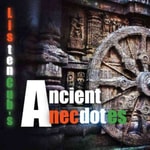Secrets of Success – Details, episodes & analysis
Podcast details
Technical and general information from the podcast's RSS feed.

Secrets of Success
Rasajna Dasa
Frequency: 1 episode/15d. Total Eps: 115

Recent rankings
Latest chart positions across Apple Podcasts and Spotify rankings.
Apple Podcasts
🇫🇷 France - spirituality
27/12/2024#79🇫🇷 France - spirituality
26/12/2024#59🇫🇷 France - spirituality
25/12/2024#45
Spotify
No recent rankings available
Shared links between episodes and podcasts
Links found in episode descriptions and other podcasts that share them.
See allRSS feed quality and score
Technical evaluation of the podcast's RSS feed quality and structure.
See allScore global : 43%
Publication history
Monthly episode publishing history over the past years.
97_Bhagavad Gita: Chapter 9, Verse 26
mercredi 27 novembre 2024 • Duration 01:13:22
Join the Whatsapp Group for daily messages and if you have any questions: https://chat.whatsapp.com/FU4pxFWwiBmDLW8lHNliZr
Join Secrets of Success on Telegram:
Join LIVE session on SAVAJI ONLINE YouTube Channel every Sunday https://www.youtube.com/@savajionline
For the intelligent person, it is essential to be in Kṛṣṇa consciousness, engaged in the transcendental loving service of the Lord, in order to achieve a permanent, blissful abode for eternal happiness. The process of achieving such a marvelous result is very easy and can be attempted even by the poorest of the poor, without any kind of qualification. The only qualification required in this connection is to be a pure devotee of the Lord. It does not matter what one is or where one is situated. The process is so easy that even a leaf or a little water or fruit can be offered to the Supreme Lord in genuine love and the Lord will be pleased to accept it. No one, therefore, can be barred from Kṛṣṇa consciousness, because it is so easy and universal. Who is such a fool that he does not want to be Kṛṣṇa conscious by this simple method and thus attain the highest perfectional life of eternity, bliss and knowledge? Kṛṣṇa wants only loving service and nothing more. Kṛṣṇa accepts even a little flower from His pure devotee. He does not want any kind of offering from a nondevotee. He is not in need of anything from anyone, because He is self-sufficient, and yet He accepts the offering of His devotee in an exchange of love and affection. To develop Kṛṣṇa consciousness is the highest perfection of life. Bhakti is mentioned twice in this verse in order to declare more emphatically that bhakti, or devotional service, is the only means to approach Kṛṣṇa. No other condition, such as becoming a brāhmaṇa, a learned scholar, a very rich man or a great philosopher, can induce Kṛṣṇa to accept some offering. Without the basic principle of bhakti, nothing can induce the Lord to agree to accept anything from anyone. Bhakti is never causal. The process is eternal. It is direct action in service to the absolute whole.
Here Lord Kṛṣṇa, having established that He is the only enjoyer, the primeval Lord and the real object of all sacrificial offerings, reveals what types of sacrifices He desires to be offered. If one wishes to engage in devotional service to the Supreme in order to be purified and to reach the goal of life – the transcendental loving service of God – then one should find out what the Lord desires of him. One who loves Kṛṣṇa will give Him whatever He wants, and he avoids offering anything which is undesirable or unasked. Thus meat, fish and eggs should not be offered to Kṛṣṇa. If He desired such things as offerings, He would have said so. Instead He clearly requests that a leaf, fruit, flowers and water be given to Him, and He says of this offering, “I will accept it.” Therefore, we should understand that He will not accept meat, fish and eggs. Vegetables, grains, fruits, milk and water are the proper foods for human beings and are prescribed by Lord Kṛṣṇa Himself. Whatever else we eat cannot be offered to Him, since He will not accept it. Thus we cannot be acting on the level of loving devotion if we offer such foods.
In the Third Chapter, verse 13, Śrī Kṛṣṇa explains that only the remains of sacrifice are purified and fit for consumption by those who are seeking advancement in life and release from the clutches of the material entanglement. Those who do not make an offering of their food, He says in the same verse, are eating only sin. In other words, their every mouthful is simply deepening their involvement in the complexities of material nature. But preparing nice, simple vegetable dishes, offering them before the picture or Deity of Lord Kṛṣṇa and bowing down and praying for Him to accept such a humble offering enable one to advance steadily in life, to purify the body, and to create fine brain tissues which will lead to clear thinking. ...
96_Bhagavad Gita: Chapter 9, Verse 24 to 25
dimanche 24 novembre 2024 • Duration 39:29
Join the Whatsapp Group for daily messages and if you have any questions: https://chat.whatsapp.com/FU4pxFWwiBmDLW8lHNliZr
Join Secrets of Success on Telegram:
Join LIVE session on SAVAJI ONLINE YouTube Channel every Sunday https://www.youtube.com/@savajionline
Here it is clearly stated that there are many types of yajña performances recommended in the Vedic literatures, but actually all of them are meant for satisfying the Supreme Lord. Yajña means Viṣṇu. In the Third Chapter of Bhagavad-gītā it is clearly stated that one should only work for satisfying Yajña, or Viṣṇu. The perfectional form of human civilization, known as varṇāśrama-dharma, is specifically meant for satisfying Viṣṇu. Therefore, Kṛṣṇa says in this verse, “I am the enjoyer of all sacrifices because I am the supreme master.” Less intelligent persons, however, without knowing this fact, worship demigods for temporary benefit. Therefore they fall down to material existence and do not achieve the desired goal of life. If, however, anyone has any material desire to be fulfilled, he had better pray for it to the Supreme Lord (although that is not pure devotion), and he will thus achieve the desired result.
If one has any desire to go to the moon, the sun or any other planet, one can attain the desired destination by following specific Vedic principles recommended for that purpose, such as the process technically known as Darśa-paurṇamāsa. These are vividly described in the fruitive activities portion of the Vedas, which recommends a specific worship of demigods situated on different heavenly planets. Similarly, one can attain the Pitā planets by performing a specific yajña. Similarly, one can go to many ghostly planets and become a Yakṣa, Rakṣa or Piśāca. Piśāca worship is called “black arts” or “black magic.” There are many men who practice this black art, and they think that it is spiritualism, but such activities are completely materialistic. Similarly, a pure devotee, who worships the Supreme Personality of Godhead only, achieves the planets of Vaikuṇṭha and Kṛṣṇaloka without a doubt. It is very easy to understand through this important verse that if by simply worshiping the demigods one can achieve the heavenly planets, or by worshiping the Pitās achieve the Pitā planets, or by practicing the black arts achieve the ghostly planets, why can the pure devotee not achieve the planet of Kṛṣṇa or Viṣṇu? Unfortunately many people have no information of these sublime planets where Kṛṣṇa and Viṣṇu live, and because they do not know of them they fall down. Even the impersonalists fall down from the brahma-jyotir. The Kṛṣṇa consciousness movement is therefore distributing sublime information to the entire human society to the effect that by simply chanting the Hare Kṛṣṇa mantra one can become perfect in this life and go back home, back to Godhead.
87_Bhagavad Gita: Chapter 9, Verse 5 to 8
mercredi 13 novembre 2024 • Duration 01:05:08
Join the Whatsapp Group for daily messages and if you have any questions: https://chat.whatsapp.com/FU4pxFWwiBmDLW8lHNliZr
Join Secrets of Success on Telegram:
https://t.me/rasajnadas
Join LIVE session on SAVAJI ONLINE YouTube Channel every Sunday https://www.youtube.com/@savajionline
The Lord says that everything is resting on Him (mat-sthāni sarva-bhūtāni). This should not be misunderstood. The Lord is not directly concerned with the maintenance and sustenance of this material manifestation. Sometimes we see a picture of Atlas holding the globe on his shoulders; he seems to be very tired, holding this great earthly planet. Such an image should not be entertained in connection with Kṛṣṇa’s upholding this created universe. He says that although everything is resting on Him, He is aloof. The planetary systems are floating in space, and this space is the energy of the Supreme Lord. But He is different from space. He is differently situated. Therefore the Lord says, “Although they are situated on My inconceivable energy, as the Supreme Personality of Godhead I am aloof from them.” This is the inconceivable opulence of the Lord.
In the Nirukti Vedic dictionary it is said, yujyate ’nena durghaṭeṣu kāryeṣu: “The Supreme Lord is performing inconceivably wonderful pastimes, displaying His energy.” His person is full of different potent energies, and His determination is itself actual fact. In this way the Personality of Godhead is to be understood. We may think of doing something, but there are so many impediments, and sometimes it is not possible to do as we like. But when Kṛṣṇa wants to do something, simply by His willing, everything is performed so perfectly that one cannot imagine how it is being done. The Lord explains this fact: although He is the maintainer and sustainer of the entire material manifestation, He does not touch this material manifestation. Simply by His supreme will, everything is created, everything is sustained, everything is maintained and everything is annihilated. There is no difference between His mind and Himself (as there is a difference between ourselves and our present material mind) because He is absolute spirit. Simultaneously the Lord is present in everything; yet the common man cannot understand how He is also present personally. He is different from this material manifestation, yet everything is resting on Him. This is explained here as yogam aiśvaram, the mystic power of the Supreme Personality of Godhead.
For the ordinary person it is almost inconceivable how the huge material creation is resting in Him. But the Lord is giving an example which may help us to understand. The sky may be the biggest manifestation we can conceive. And in that sky the wind or air is the biggest manifestation in the cosmic world. The movement of the air influences the movements of everything. But although the wind is great, it is still situated within the sky; the wind is not beyond the sky. Similarly, all the wonderful cosmic manifestations are existing by the supreme will of God, and all of them are subordinate to that supreme will. As we generally say, not a blade of grass moves without the will of the Supreme Personality of Godhead. Thus everything is moving under His will: by His will everything is being created, everything is being maintained, and everything is being annihilated. Still He is aloof from everything, as the sky is always aloof from the activities of the wind.
Modes of acquiring Perfect Knowledge!
Season 1 · Episode 13
vendredi 22 mai 2020 • Duration 01:51:30
The main purpose of this session is to distinguish the Vedic method of knowledge from other methods. Humanity has different methods of knowledge available to it. I hold that only through Vedic knowledge can we grade the validity of these methods. This session examines four such methods: empiricism, skepticism, rationalism and authoritative testimony. I hold that Western science isn't capable of comparing and contrasting the validity of one method of knowledge against others. Why? Because its own basis is too narrow. That basis was summed up by Albert Einstein in Out of My Late Years (1936):
Out of the multitude of our sense experiences we take, mentally and arbitrarily, certain repeatedly occuring complexes of sense impression ... and we attribute to them a meaning the meaning of bodily objects.
Einstein admitted that this method cannot even prove the existence of the external world. So how can we be sure that the bodily objects scientists study are real things? Aren't such objects just mental interpretations of a jumble of sense data that, with a nonhuman mind, or even with a human mind culturally different than ours, could be interpreted in a very different way? Wouldn't a different interpretation of sense data reveal a very different world? Which interpretation is the right one? And how, by this method Einstein described, can we ever know whether there is a reality outside the range of our sense experiences? These questions are not for science to answer. They are for philosophy. There is a difference between the scientific approach and the philosophical approach. Substance and Shadow takes the latter; it is therefore not remarkable that a scientifically-minded person could have a problem with my book. Of course, science began in philosophy. But it cut its ties to the parent as it accelerated down the narrow path of the study of bodily objects. Professor Lewis Wolpert, erudite biologist at London's University College, writes that most scientists today are ignorant of philosophical issues. Though at the beginning of the twentieth century a professional scientist normally had a background in philosophy,
Today things are quite different, and the stars of modern science are more likely to have been brought up on science fiction ... the physicist who is a quantum mechanic has no more knowledge of philosophy than the average car mechanic.
Battling Temptations!
Season 1 · Episode 11
mardi 19 mai 2020 • Duration 01:20:49
Anger Management
Season 1 · Episode 12
mardi 19 mai 2020 • Duration 02:03:55
Angriness may be an issue in your every day life if you let it be. Not only does it interrupt your work and play, but it may hurt you when you least anticipate it. Anger has an underhanded way of making itself known in the rarest of situations, and most you do not have any control over.
Some of the times individuals don’t even know that they're angry till something occurs to touch off the sudden alteration in mood. If this has happened to you, you might feel that there's no way to repair your fundamental problem as you don’t understand where it comes from. Many people have never heard if this and have no idea how to go about figuring out where they are or how to change it.
Is this true for you? Then please listen to this podcast as you need to discover the secrets that help you deal with anger issues!
02_Bhagavad Gita: Chapter 1, Verse 1 to 3
Season 1 · Episode 2
dimanche 17 mai 2020 • Duration 01:11:38
Bhagavad-gita is the widely read theistic science summarized in the Gita-mahatmya (Glorification of the Gita). There it says that one should read Bhagavad-gita very scrutinizingly with the help of a person who is a devotee of Sri Krsna and try to understand it without personally motivated interpretations. The example of clear understanding is there in the Bhagavad-gita itself, in the way the teaching is understood by Arjuna, who heard the Gita directly from the Lord. If someone is fortunate enough to understand Bhagavad-gita in that line of disciplic succession, without motivated interpretation, then he surpasses all studies of Vedic wisdom, and all scriptures of the world. One will find in the Bhagavad-gita all that is contained in other scriptures, but the reader will also find things which are not to be found elsewhere. That is the specific standard of the Gita. It is the perfect theistic science because it is directly spoken by the Supreme Personality of Godhead, Lord Sri Krsna.
The topics discussed by Dhrtarastra and Sanjaya, as described in the Mahabharata, form the basic principle for this great philosophy. It is understood that this philosophy evolved on the Battlefield of Kuruksetra, which is a sacred place of pilgrimage from the immemorial time of the Vedic age. It was spoken by the Lord when He was present personally on this planet for the guidance of mankind.
The word dharma-ksetra (a place where religious rituals are performed) is significant because, on the Battlefield of Kuruksetra, the Supreme Personality of Godhead was present on the side of Arjuna. Dhrtarastra, the father of the Kurus, was highly doubtful about the possibility of his sons' ultimate victory. In his doubt, he inquired from his secretary Sanjaya, "What did my sons and the sons of Pandu do?" He was confident that both his sons and the sons of his younger brother Pandu were assembled in that Field of Kuruksetra for a determined engagement of the war. Still, his inquiry is significant. He did not want a compromise between the cousins and brothers, and he wanted to be sure of the fate of his sons on the battlefield. Because the battle was arranged to be fought at Kuruksetra, which is mentioned elsewhere in the Vedas as a place of worship—even for the denizens of heaven—Dhrtarastra became very fearful about the influence of the holy place on the outcome of the battle. He knew very well that this would influence Arjuna and the sons of Pandu favorably, because by nature they were all virtuous. Sanjaya was a student of Vyasa, and therefore, by the mercy of Vyasa, Sanjaya was able to envision the Battlefield of Kuruksetra even while he was in the room of Dhrtarastra. And so, Dhrtarastra asked him about the situation on the battlefield.
Both the Pandavas and the sons of Dhrtarastra belong to the same family, but Dhrtarastra's mind is disclosed herein. He deliberately claimed only his sons as Kurus, and he separated the sons of Pandu from the family heritage. One can thus understand the specific position of Dhrtarastra in his relationship with his nephews, the sons of Pandu. As in the paddy field the unnecessary plants are taken out, so it is expected from the very beginning of these topics that in the religious field of Kuruksetra where the father of religion, Sri Krsna, was present, the unwanted plants like Dhrtarastra's son Duryodhana and others would be wiped out and the thoroughly religious persons, headed by Yudhisthira, would be established by the Lord. This is the significance of the words dharma-ksetre and kuru-ksetre, apart from their historical and Vedic importance.
Bhagavad Gita - Introduction
Season 2 · Episode 1
lundi 11 mai 2020 • Duration 01:19:44
The Bhagavad-gita is universally renowned as the jewel of India's spiritual wisdom. Spoken by Lord Krishna, the Supreme Personality of Godhead to His intimate disciple Arjuna, the Gita's seven hundred concise verses provide a definitive guide to the science of self realization. No other philosophical or religious work reveals, in such a lucid and profound way, the nature of consciousness, the self, the universe and the Supreme.
His Divine Grace A.C. Bhaktivedanta Swami Prabhupada is uniquely qualified to present this English translation and commentary on Bhagavad-gita. He is the world's foremost Vedic scholar and teacher, and he is also the current representative of an unbroken chain of fully self-realized spiritual masters beginning with Lord Krishna Himself.
Join us in this journey of Spiritual Evolution!!!
Making Life An Adventure!
Season 1 · Episode 9
mercredi 6 mai 2020 • Duration 01:57:45
Learning the principles of adventure through an adventurous story!!!
Yoga For Modern Age
Season 1 · Episode 10
mercredi 6 mai 2020 • Duration 02:02:58
Discussing the meaning of yoga and different types of yoga systems mentioned in the vedic scriptures for different cosmic ages.
Mantra meditation is the recommended yoga for modern times. Listen and get to know the power of sound meditation.
Join me on Telegram to receive positive messages daily:
https://t.me/rasajnadas





